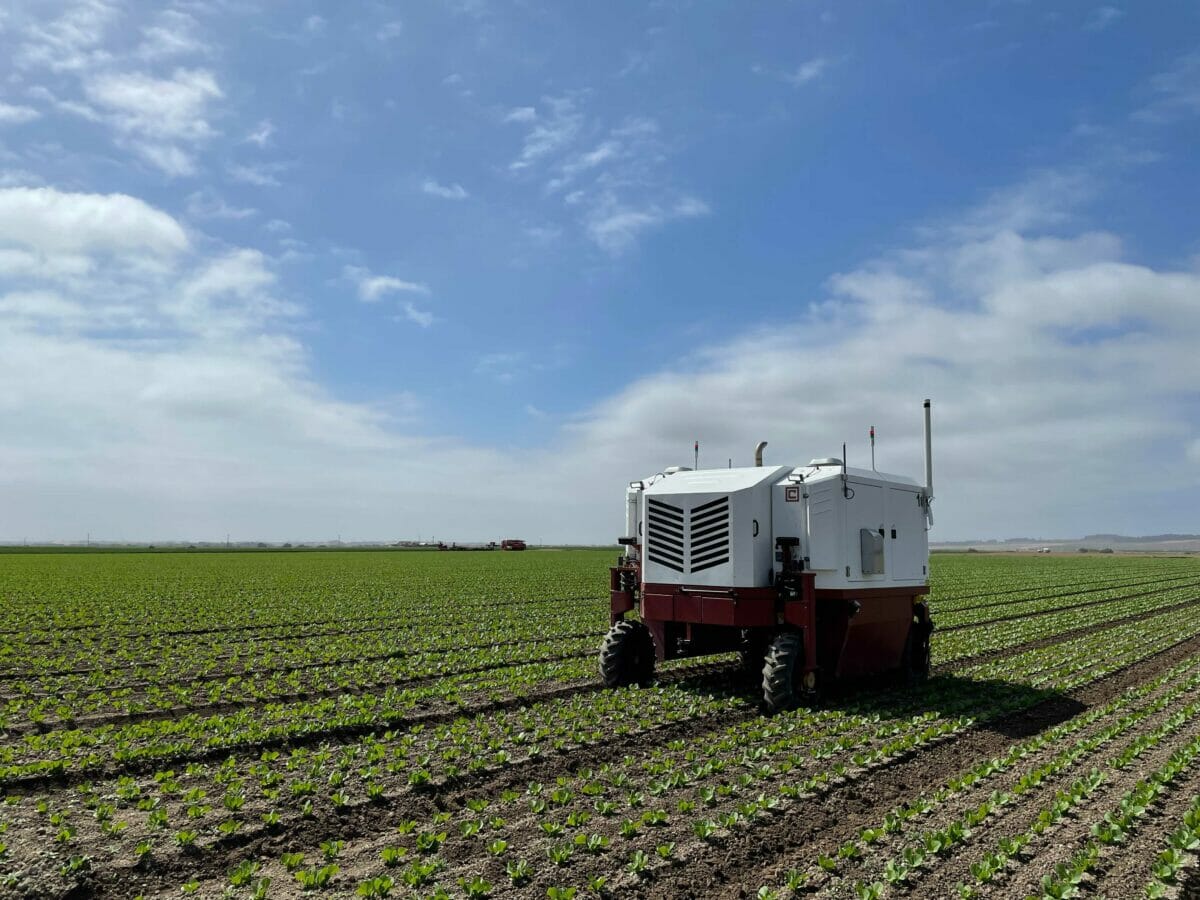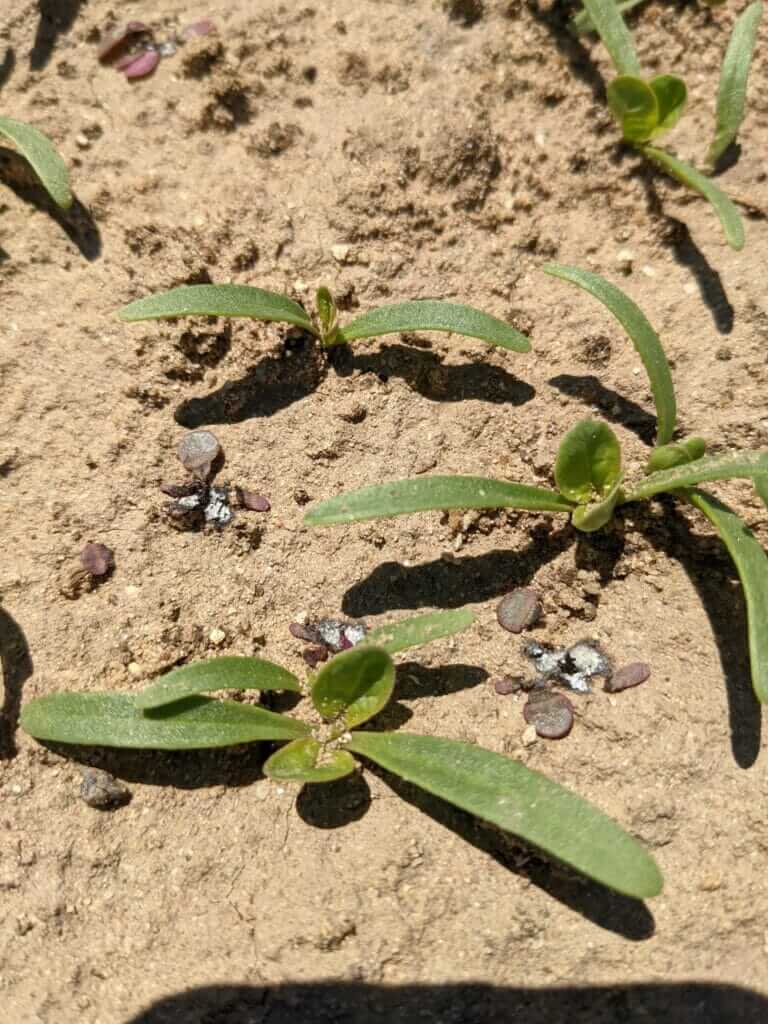Will Laser-Weeding Robots Change Farming?
The latest tech innovation to land in the fields.
Will Laser-Weeding Robots Change Farming?
The latest tech innovation to land in the fields.

These 9,500-pound machines are said to zap around 100,000 weeds per hour. courtesy of Carbon Robotics.
James Johnson has witnessed the wrath of industrial agriculture. For decades, he and his family used fertilizer, herbicide and pesticide to achieve optimal yields on their 3,100-acre farm in New Mexico. And it all finally caught up with them.
“It was like we had 40, 50 years of success and then suddenly we plateaued and started falling off this cliff,” he says. “I started to look at what we were doing and realized most of it was self-inflicted. We were hurting the biology…and a huge amount of our budget was going towards chemistry.”
In an effort to regenerate the land and eliminate the need for chemical application, the fourth generation farmer—who grows onions, cotton, pistachios and peppers—has been experimenting with other options. One innovative piece of technology he’s been using? The Autonomous LaserWeeder, an automated machine that Johnson says has replaced the need for weeding fields by hand.
Since 2019, as part of a pilot project for the Seattle tech start-up Carbon Robotics (the company that makes the Autonomous LaserWeeder), the 9,500-pound machine has been traversing rows on Johnson’s farm. Rolling through the fields at five miles-per-hour with the capacity to clear anywhere from 15 to 20 acres each day, the machines use a combination of laser technology, GPS and artificial intelligence (AI) to kill 100,000 weeds per hour.
The machine’s lasers zap the weeds while the GPS, cameras and AI technologies allow the machines to be self-driving and help it differentiate weeds from crops. And because these gadgets use thermal energy to remove the weeds instead of physical intervention like tilling or chemicals, the company says the machine doesn’t disrupt the soil. The Autonomous LaserWeeder is powered by diesel and burns about 22 gallons in 20 hours, according to Johnson.

Farmers use herbicide on a majority of the world’s agricultural fields and globally spray enough to cover every acre of farmland in the world with half a pound of it each year. The introduction of the Autonomous LaserWeeder comes at a time when herbicides, and specifically active ingredients like glyphosate, are under scrutiny. A number of studies, for example, have linked glyphosate to negative environmental and public health impacts. And over the past two years, three court cases have resulted in multimillion-dollar verdicts for complainants who argued that glyphosate gave them cancer, like non-Hodgkin lymphoma.
Paul Mikesell, CEO of Carbon Robotics, says these problems have been at the heart of his motivation to develop a product that provides farmers with a better way to manage weed control. With enough robots trucking through pasture, he hopes to have a transformative effect on the food system.
“We can’t keep over-relying on chemicals,” says Mikesell. “I often think about how exciting it will be to get to the point where over time we can reduce the use of herbicides and pesticides for farmers and to be improving the human health side of things.”
Mikesell says it’s important to also consider the economic benefits of laser-weeding units. According to USDA data, crop inputs like chemicals, fertilizers and seeds make up roughly 28 percent of farmers’ total spending on average; and labor constitutes about 13.8 percent. From internal studies Carbon Robotics has conducted, the company found that the machines have the capability to save up to 80 percent in expenses on farms, helping to ease anxieties over finding labor, which has been a challenge for many producers, especially during the pandemic.
LEARN MORE
Using a food’s unique fingerprint to fight food fraud.
There’s clearly a demand for laser-weeding robots. The company sold out of its 2021 and 2022 Autonomous LaserWeeder models and has started taking pre-orders for 2023. While Carbon Robotics did not share exact pricing information, Mikesell says the cost is comparable to a mid-size tractor (which can range anywhere between $25,000 and $50,000). While the current model is designed for larger farms of 200 acres to tens of thousands of acres, Mikesell says there are plans in the works to provide an option for small-scale operations; that model will land in 2023 or later.
Carbon Robotics is the only business with a laser-weeding machine on the market at this point. But other emerging start-ups, such as WeedBot in Latvia, told Modern Farmer via email that there are plans to launch other laser-weeding models in the months to come.
Johnson, who is already well acquainted with the technology, believes it’s just a matter of time before laser-weeding robots become a staple on American farms. “It doesn’t matter if you’re a conventional farmer, a regenerative farmer, an organic farmer, everybody’s dealing with a struggle in weed control in some way,” he says. “Most people are looking for something better than what traditionally exists… I really see the writing on the wall that this is the future. And that’s one of the reasons that I’ve jumped in so wholeheartedly.”
Follow us

This work is licensed under a Creative Commons Attribution-NoDerivatives 4.0 International License.
Want to republish a Modern Farmer story?
We are happy for Modern Farmer stories to be shared, and encourage you to republish our articles for your audience. When doing so, we ask that you follow these guidelines:
Please credit us and our writers
For the author byline, please use “Author Name, Modern Farmer.” At the top of our stories, if on the web, please include this text and link: “This story was originally published by Modern Farmer.”
Please make sure to include a link back to either our home page or the article URL.
At the bottom of the story, please include the following text:
“Modern Farmer is a nonprofit initiative dedicated to raising awareness and catalyzing action at the intersection of food, agriculture, and society. Read more at <link>Modern Farmer</link>.”
Use our widget
We’d like to be able to track our stories, so we ask that if you republish our content, you do so using our widget (located on the left hand side of the article). The HTML code has a built-in tracker that tells us the data and domain where the story was published, as well as view counts.
Check the image requirements
It’s your responsibility to confirm you're licensed to republish images in our articles. Some images, such as those from commercial providers, don't allow their images to be republished without permission or payment. Copyright terms are generally listed in the image caption and attribution. You are welcome to omit our images or substitute with your own. Charts and interactive graphics follow the same rules.
Don’t change too much. Or, ask us first.
Articles must be republished in their entirety. It’s okay to change references to time (“today” to “yesterday”) or location (“Iowa City, IA” to “here”). But please keep everything else the same.
If you feel strongly that a more material edit needs to be made, get in touch with us at [email protected]. We’re happy to discuss it with the original author, but we must have prior approval for changes before publication.
Special cases
Extracts. You may run the first few lines or paragraphs of the article and then say: “Read the full article at Modern Farmer” with a link back to the original article.
Quotes. You may quote authors provided you include a link back to the article URL.
Translations. These require writer approval. To inquire about translation of a Modern Farmer article, contact us at [email protected]
Signed consent / copyright release forms. These are not required, provided you are following these guidelines.
Print. Articles can be republished in print under these same rules, with the exception that you do not need to include the links.
Tag us
When sharing the story on social media, please tag us using the following: - Twitter (@ModFarm) - Facebook (@ModernFarmerMedia) - Instagram (@modfarm)
Use our content respectfully
Modern Farmer is a nonprofit and as such we share our content for free and in good faith in order to reach new audiences. Respectfully,
No selling ads against our stories. It’s okay to put our stories on pages with ads.
Don’t republish our material wholesale, or automatically; you need to select stories to be republished individually.
You have no rights to sell, license, syndicate, or otherwise represent yourself as the authorized owner of our material to any third parties. This means that you cannot actively publish or submit our work for syndication to third party platforms or apps like Apple News or Google News. We understand that publishers cannot fully control when certain third parties automatically summarize or crawl content from publishers’ own sites.
Keep in touch
We want to hear from you if you love Modern Farmer content, have a collaboration idea, or anything else to share. As a nonprofit outlet, we work in service of our community and are always open to comments, feedback, and ideas. Contact us at [email protected].by Lindsay Campbell, Modern Farmer
December 30, 2021
Modern Farmer Weekly
Solutions Hub
Innovations, ideas and inspiration. Actionable solutions for a resilient food system.
ExploreExplore other topics
Share With Us
We want to hear from Modern Farmer readers who have thoughtful commentary, actionable solutions, or helpful ideas to share.
SubmitNecessary cookies are absolutely essential for the website to function properly. This category only includes cookies that ensures basic functionalities and security features of the website. These cookies do not store any personal information.
Any cookies that may not be particularly necessary for the website to function and are used specifically to collect user personal data via analytics, ads, other embedded contents are termed as non-necessary cookies.
First, I am not a farmer so perhaps my questions are misguided. My apologies in advance. Wouldn’t running a 9,500 lb machine up and down crop rows lead to massive compaction? Also, if you are concerned about the environment and quitting using pesticides and herbicides, isn’t using diesel power counterproductive? Don’t get me wrong, I love the idea but …
This machine is god send for farmers all over the world. We can improve to have smaller electric machine in future to change face of farming
When I use a propane weed burner around my property it seems to supercharge weed growth. Won’t this do the same thing, because it is just basically burning off the tops of the weeds?
Hello sir u want to know about the laser weeding robot si please tell me about in detail